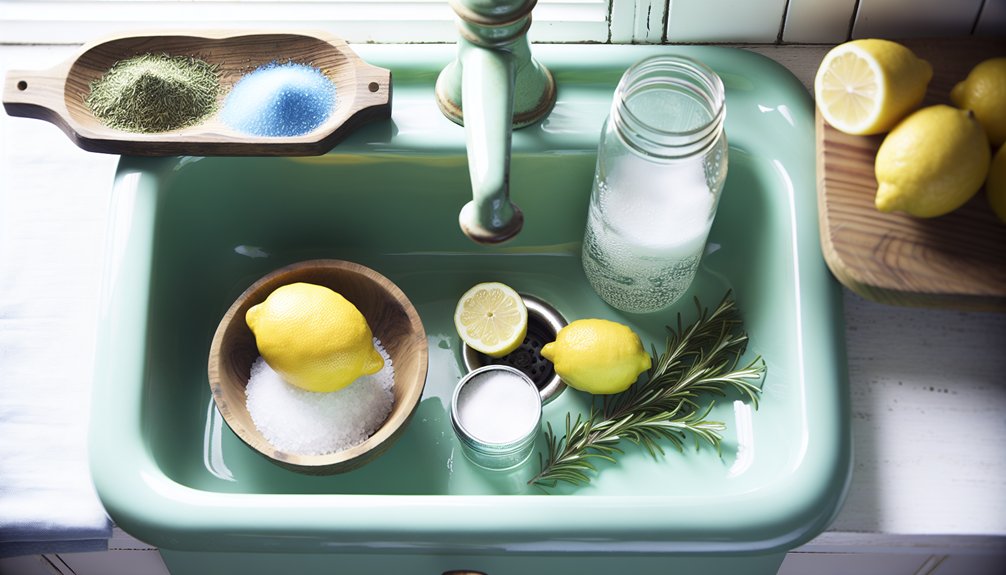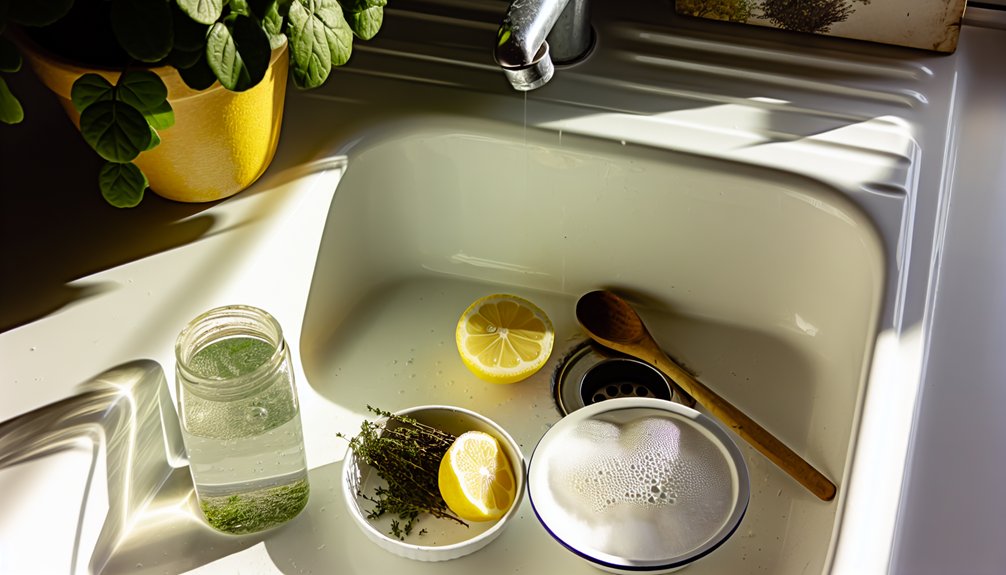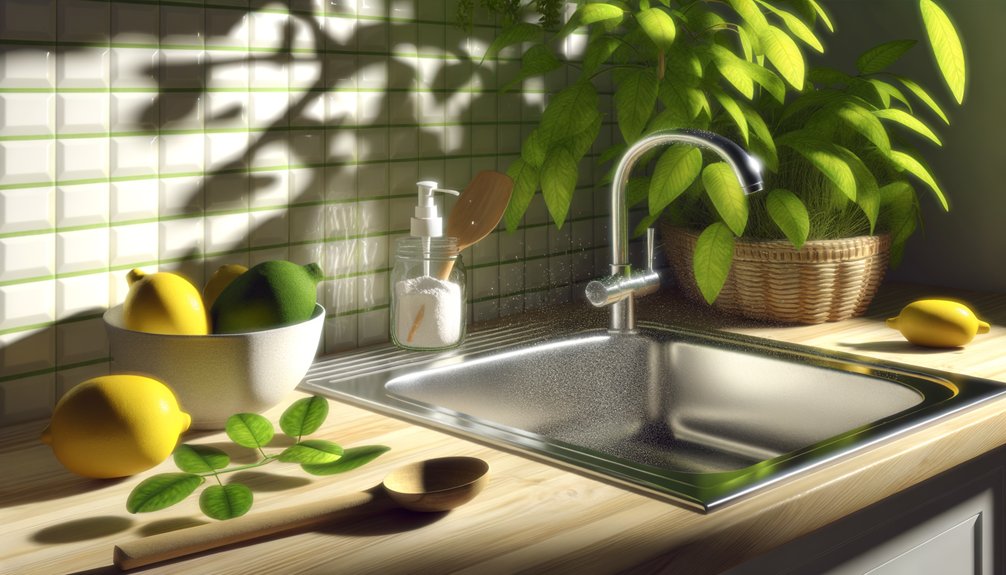Individuals can effectively unclog drains using natural remedies like a mixture of baking soda and vinegar, which creates a fizzy reaction that helps break down debris. For stubborn clogs, combining salt and baking soda followed by hot water is recommended. Mechanical techniques, such as using a wire hanger or drain snake, can further assist in clearing blockages. Regular maintenance and preventive measures, such as flushing with boiling water, can minimize future issues. More techniques and tips await exploration.
Effective Natural Remedies for Clogged Drains

When faced with a clogged drain, individuals can turn to several effective natural remedies that utilize common household ingredients. One powerful combination involves mixing 1/2 cup of baking soda with 1/2 cup of vinegar, which creates a fizzy reaction that helps break down clogs; allowing it to sit for one hour before flushing with boiling water enhances its effectiveness. For stubborn clogs, a mixture of 1/2 cup of salt and 1/2 cup of baking soda can be left to sit for 30 minutes before rinsing with hot water.
Regularly pouring boiling water down the drain is beneficial for melting away grease and soap scum, particularly in kitchen sinks. Additionally, a mixture of dish soap and hot water can effectively liquefy grease clogs. An eco-friendly alternative includes combining 1/2 cup of baking soda with 1/2 cup of lemon juice, which deodorizes and unclogs drains when followed by boiling water.
Mechanical Techniques for Unclogging Drains
Mechanical techniques for unclogging drains offer practical solutions that complement natural remedies. A wire hanger can be transformed into a makeshift plumbing tool by straightening it and forming a hook, enabling users to extract hair and food debris from clogged drains effectively. For deeper blockages, a drain snake is the preferred mechanical method, designed to break through tough clogs that a wire hanger may not dislodge. It is essential to collect debris removed during these processes to prevent further issues. If clogs persist, repeating the techniques may guarantee all obstructions are cleared. In cases of severe clogs, a wet and dry vacuum becomes invaluable, providing powerful suction to dislodge stubborn blockages by forming a tight seal around the drain opening. These mechanical methods can notably enhance the effectiveness of drain maintenance, offering a liberating approach to managing plumbing challenges.
Preventive Measures to Avoid Future Clogs

Implementing effective preventive measures can greatly reduce the likelihood of future clogs in household drains. By adopting these strategies, homeowners can maintain a free-flowing plumbing system and minimize the risk of drain blockage.
- Install hair traps in shower drains to capture hair and larger debris.
- Regularly flush drains with boiling water to dissolve soap scum and grease.
- Use a mixture of baking soda and vinegar monthly to prevent buildup of food particles.
- Avoid disposing of large food particles, vegetable peels, and eggshells in sinks.
- Maintain a proper garbage disposal routine by running it frequently and flushing it with hot water.
Additionally, conducting routine checks for slow drainage or unusual odors can serve as an early warning system, allowing for timely intervention. By following these preventive measures, homeowners can enjoy a liberated plumbing experience, free from the worries of clogs and blockages.
Frequently Asked Questions
How to Unclog Your Drain Naturally?
To address clogged drains naturally, individuals can utilize various drain maintenance tips. A combination of vinegar and baking soda serves as an effective eco-friendly product, while a DIY drain snake, such as a bent wire coat hanger, helps physically remove debris. Regularly flushing drains with boiling water aids in clogged drain prevention. Incorporating essential oils benefits enhances the smell during the process, making safe drain unclogging a pleasant experience with household remedies.
What Is the Best Homemade Drain Cleaner?
In the domain of home remedies, the quest for a powerful homemade drain cleaner reveals a tapestry of options. The baking soda and vinegar solution ignites a fizzy reaction, while salt water enhances the cleansing synergy. Combining lemon juice with hot water infuses freshness, and biodegradable soap or hydrogen peroxide can further dissolve debris. Essential oils offer fragrant relief, while natural enzymes work tirelessly to maintain flow, ensuring liberation from stubborn clogs without harsh chemicals.
What Will Dissolve a Blocked Drain?
To dissolve a blocked drain, several methods can be employed. The baking soda and vinegar reaction creates carbon dioxide, which helps dislodge debris. Salt water can also assist in breaking down clogs due to its corrosive nature. Enzyme cleaners effectively digest organic matter, while boiling water can liquefy grease. Dish soap, when combined with hot water, aids in clearing blockages. Additionally, a peroxide solution or citrus peels can contribute to effective drain maintenance and cleanliness.
What Will Dissolve Hair in a Drain?
To effectively dissolve hair in a drain, various methods can be employed. A vinegar solution combined with baking soda initiates a chemical reaction that aids in hair removal. Enzyme cleaners, which utilize biological components, target organic matter, providing efficient drain cleaning. Regular flushing with hot water enhances the effectiveness of these methods. Implementing preventative measures, such as hair traps and routine maintenance tips, can greatly reduce future clogs caused by hair accumulation.


